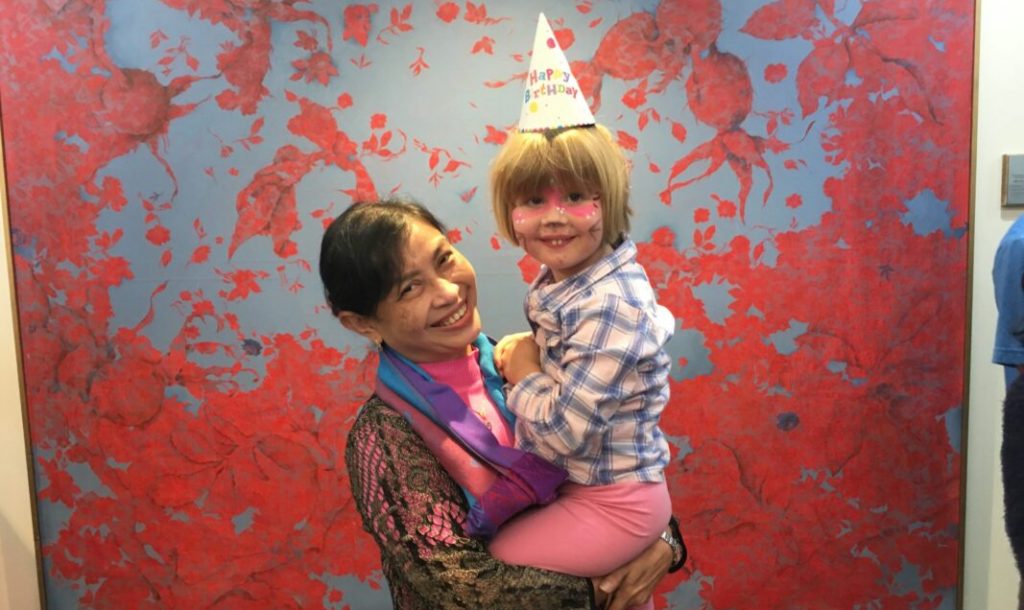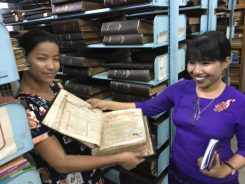Over the past two years there have been many tragedies due to COVID-19. August 2021, very sadly, saw the passing of Dr Ni Win Zaw, Professor (Head), Department of Library and Information Studies, University of Yangon, from this dreadful virus. Myanmar has lost a great professional leader. The future of library education and preservation of library and archive collections across the country has suffered from this setback which will take years to overcome.
Dr Ni Win Zaw was a dedicated professional, making an outstanding contribution to library and information sciences and library education. I first met her in 2016 when she volunteered a project to be part of a program of research activities organised between the University of Yangon and the Australian National University. She was passionate and clear about the need to develop education for librarianship to encompass digital library theory and practice. With the support of my colleague Associate Professor Mary Carroll from Charles Sturt University, I was privileged to lead a project with Dr Ni Win Zaw to reform the curriculum to develop digital librarianship within the postgraduate program. The project included reciprocal visits, workshops, the establishment of a small digitisation laboratory at the University of Yangon, and curriculum development.
Dr Ni Win Zaw was a passionate educator. She dedicated her life to improving library education to produce graduates who would manage and preserve the historic record in archives and libraries, protecting the cultural heritage of the nation.
Completing her Diploma in Library Science in 1987 and Master of Arts in Library and Information Studies 2001 at the University of Yangon, she was awarded a PhD at the University of Yangon in 2013. Her dissertation “An Analytical Study of the Accessibility of Web-based Full-text Database of Myanmar Rare Newspapers (1843-1920)” explored the use of digital technology to make Myanmar’s newspaper archives available to researchers.
Library and information science was first established as a course at the University of Yangon in 1971. The PhD programme commenced in 2008. It is the only university in Myanmar offering a PhD degree in Library and Information Studies. For Dr Ni Win Zaw the university was significant as it enabled her to successfully complete her undergraduate and postgraduate studies in the preeminent research university in the country. Library studies has also been taught at the University of East Yangon since 2000, and at Yadanabon University since its establishment as a university in 2003 (previously a college from 2000-2003). There are no archives or records management courses in the country. The education programs led by Dr Ni Win Zaw has been vital to establish capabilities for the broad knowledge management disciplines. Her graduates have led archive and records activities as well as becoming library leaders.
If you visit any library or archive throughout Myanmar today you will find professionals who graduated under Dr Ni Win Zaw’s guidance. Her impact through education was significant. Her leadership of the PhD program brought a considerable increase in capability to deliver library services in universities, national institutions such as the national library and national archives, government bodies, and not for profit organisations. As a leader of her profession she was a significant contributor to the Myanmar Library Association, taking on the role of Associate Secretary from 2006-2010 and Member of the Executive Committee from 2014 until she passed.
Myanmar librarians and educators previously had few opportunities to connect with the rest of the world. Over the past 5 years opportunities for engagement increased, with the west focusing on training and support in librarianship for practicing librarians, such as through the e-lib program. Dr Ni Win Zaw sought out ways to improve library education to ensure that a new generation of library graduates could take programs of information/digital literacy forward and open up access to the collections. We were fortunate to host her two visits to the Australian National University, most recently in 2017 with a program including visits to many Canberra libraries and Charles Sturt University. She also extended her knowledge through attendance at a workshop held in Kyoto University, Kyoto, Japan.
The eLibrary Myanmar Project is helping libraries make the leap from isolation to digitisation, both of their own outstanding collections and global publications.
Connecting Myanmar libraries to global academia
Sadly, library and archive collections in Myanmar have received very limited funding over the years. The collections have deteriorated because of the climate, with humidity and temperature variation causing damage. There are few qualified staff to undertake preservation work. Salaries for the library and information professions are low creating an additional problem in attracting staff and students to the profession. The loss of access to the memory of the nation has a debilitating effect on education and citizens participation in society. Dr Ni Win Zaw saw the need for an urgent change to create graduates equipped to prevent further loss—whether of palm leaf manuscripts or printed materials—through the application of new technology for digital preservation and access. Her work to develop digital library skills attests to her ability to create a highly relevant education program. The systematic failure to adequately support libraries and education continues to be an issue that requires national leadership for the benefit of citizens.
Dr Ni Win Zaw’s vision and commitment to development of education will take considerable time to replace. Her desire to fill a gap in archive and manuscript education remains a burning issue for the future for the university and the profession. The need for urgent change to ensure Myanmar’s heritage is preserved had never been more important. The physical devastation to educational institutions that store heritage collections during the protests puts that heritage at risk. Myanmar remains without a program to educate archivists and record managers.
In recognising the life of Dr Ni Win Zaw I would like to highlight her contribution as head of a hall of residence at the University of Yangon as well as her teaching and department head roles. She was also a much-loved family member, whose affection for young children can be seen in the warmth of her relationship with my granddaughter Ripley, who also misses her.
Vale Dr Ni Win Zaw
 Facebook
Facebook  Twitter
Twitter  Soundcloud
Soundcloud  Youtube
Youtube  Rss
Rss 



